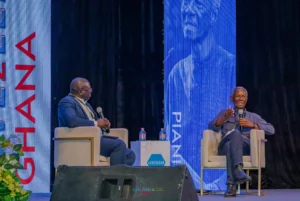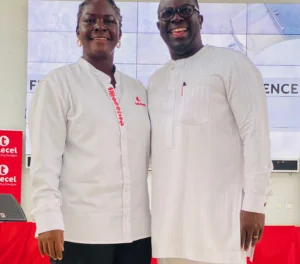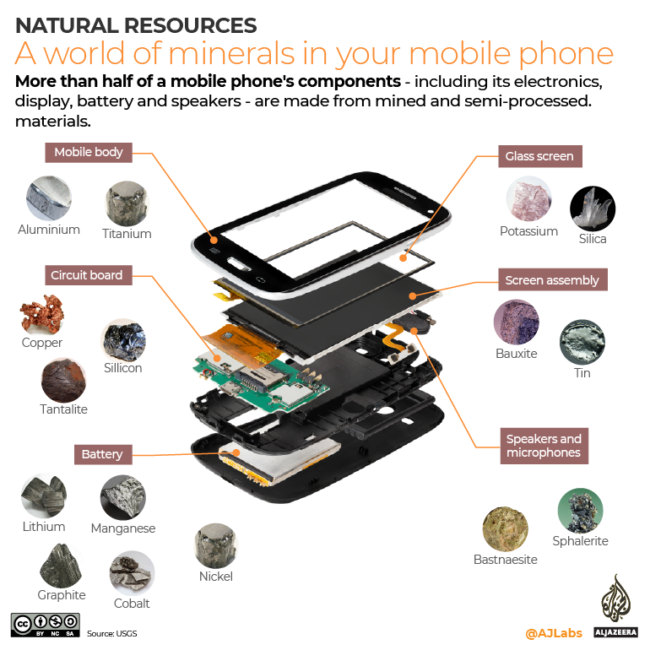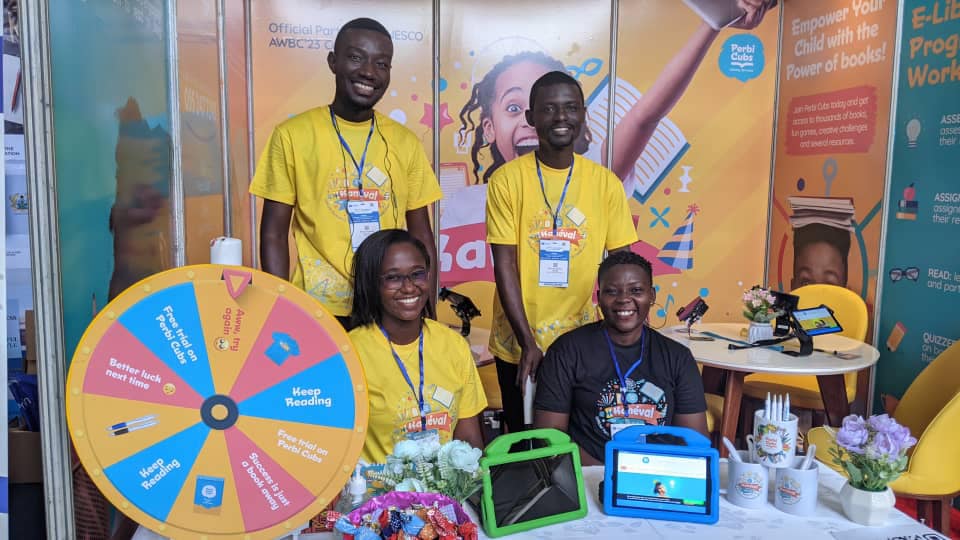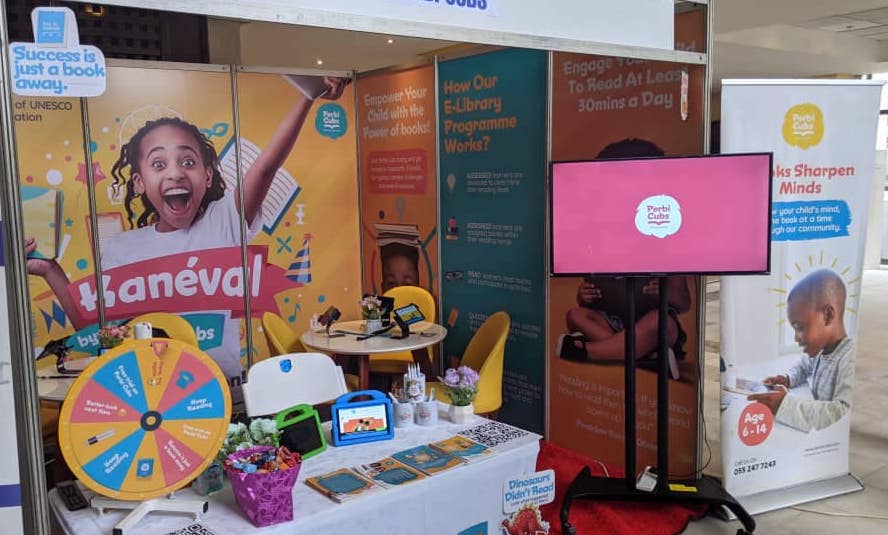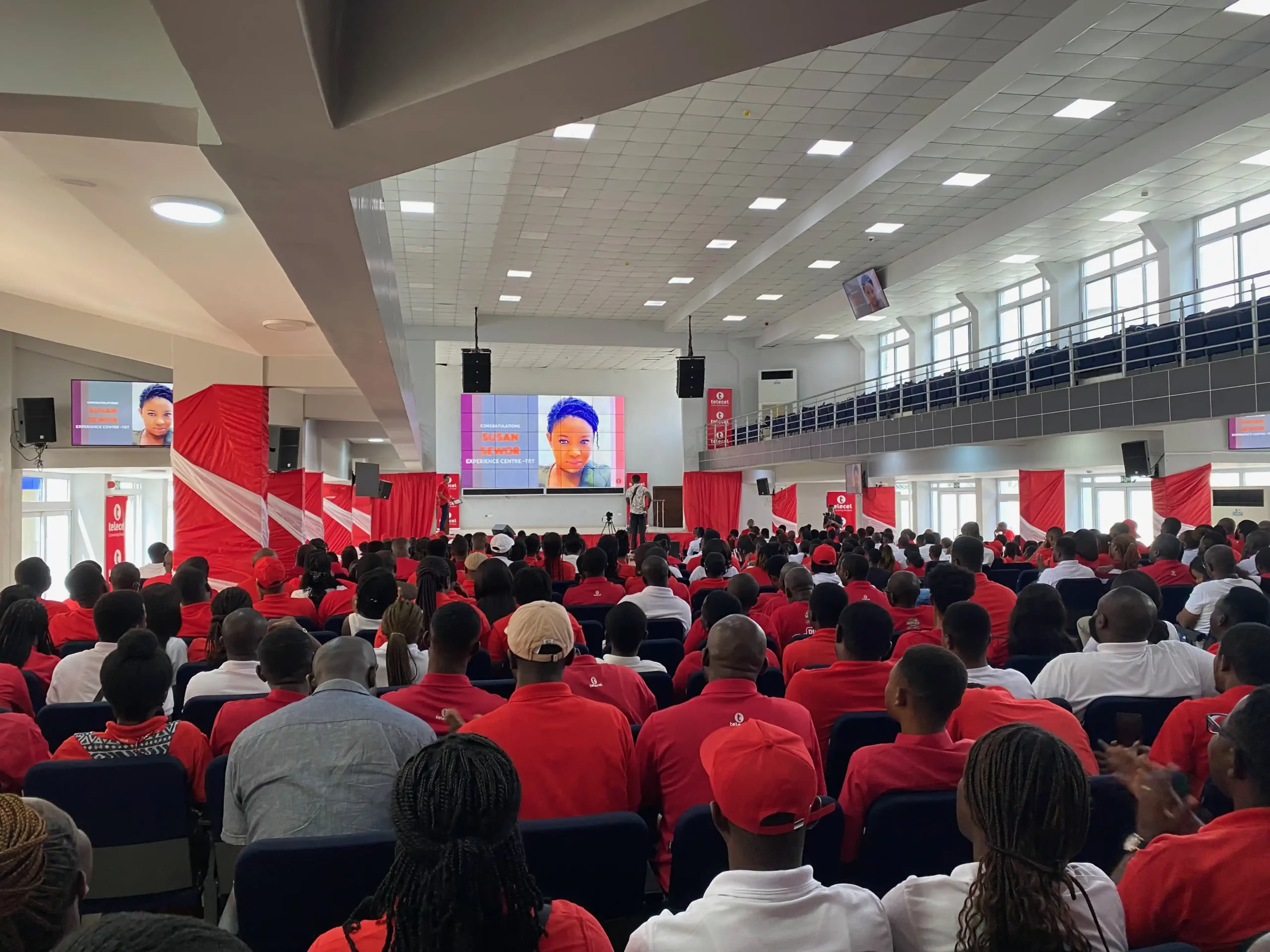
INTRAPRENEURS: THE ENTREPRENEURS WITHIN
INTRODUCTION
Telecel Ghana, formerly Vodafone Ghana, has an amazing annual practice of bringing together its 1,300-strong frontliners to appreciate them—not just with words but in awards—and ginger them up to do even better for their clientele. This Frontline Engagement Conference, as they call it, typically happens during the global Customer Service Week in October, which they’ve extended to the whole month to appreciate their customers.
This year, as the principal coach/speaker/trainer at Perbi Executive Leadership Education (PELÉ), Telecel extended to yours truly the humbling opportunity to address their army of frontliners and frontline support staff. Frontliners mean everything to any business! They are essential workers whose jobs depend on in-person interactions and often involve some form of risk, even if it’s verbal abuse. If this were soccer, frontliners would be our strikers! No scoring on this front, no bottomline success. Period. I was particularly impressed that the CEO of Telecel, Ing. Patricia Obo-Nai, prioritised this event such that not only was she in attendance from start to finish, she was fully present and participatory to the max.
This article aims to summarise the keynote I delivered on behalf of PELÉ entitled, “WANTED: INTRAPRENEURS!” This burning message to the rank and file of a top-tier provider of digital and telecommunications solutions across the African continent is one which, quite frankly, every company and organisation needs to hear.
FUNNY BUT NOT FUNNY
Several years ago, I had an appointment in downtown Accra but needed to pass through the bank to make a transaction first. I waited and waited and waited… and it was becoming evident that I might miss my appointment altogether. So, I got up and approached one of the bankers to express both my frustration and concern that I needed to make it for an appointment and here I was stuck in the bank.
Here was her response (I kid you not; and I remember as though it were yesterday): “Nti wonni time na w’aba bank no?” she said in Twi. To wit, “So you don’t have time and you came to the bank?” Needless to say, I was stupefied; or rather, mortified. If there ever was the opposite of a staff being intrapreneurial, it is that!
DEFINING INTRAPRENEUR(SHIP)
Everyone knows about entrepreneurs and entrepreneurship. But what in the world is an intrapreneur—and then intrapreneurship? To cover our bases, Investopedia defines an entrepreneur as “an individual who creates a new business, bearing most of the risks and enjoying most of the rewards. The process of setting up a business is known as entrepreneurship. The entrepreneur is commonly seen as an innovator, a source of new ideas, goods, services, and business/or procedures” (emphases mine).
With that at the back of our minds, the simplest definition of an intrapreneur would be an employee who behaves like an entrepreneur. Rather than going out to create a new business/organisation, they stay within it and use their innate entrepreneurial aptitudes and attitudes to significantly grow it. Gifford Pinchot III (1985) defined intrapreneurs as, “Dreamers who do. Those who take responsibility for creating an innovation of any kind within an organisation.” He is credited with inventing the concept of intrapreneurship in a paper that he and his wife, Elizabeth Pinchot, wrote in 1978 titled “Intra-Corporate Entrepreneurship.” Intrapreneurs then, are entrepreneurs within–within themselves and within their organisations/businesses.
DIGGING DEEPER
Intrapreneurs have an attitude and style that integrates Responsibility, Risk-taking, Ownership, Innovation (ROI). I like that these basic characteristics spell ROI, literally portraying how it’s entrepreneurs who bring a company its best Return on Investment (ROI). Roi, the French word for king, is also apt, for intrapreneurs are royalty in establishments, they are the kings and queens of any business. In 2014, Forbes declared that intrapreneurs are the most valuable employees from here on out. “Social intrapreneurs are quickly becoming the most valuable employees at many companies because they are good for the bottom line, good for the brand, and good for staff morale.” [1]
At the core of ROI is ownership, owning the opportunities and challenges at the workplace, assessing situations and taking responsibility (the R again) for one’s attitude, behaviour and outcomes. Here is where I challenge Management about ensuring they provide the legal and logistical framework—as well as whatever enabling environment—that empowers employees to take initiative and risk to innovatively solve problems boldly. A great example is the Ritz-Carlton hotel chain which has for many years given staff $2,000 of discretion to be used to solve any customer complaint in the manner the employee feels is appropriate. And this is daily! I recall hearing the author of The New Gold Standard: 5 Leadership Principles for Creating a Legendary Customer Experience Courtesy of The Ritz-Carlton Hotel Company tease out how this incentive works in practice and that the training is that if a customer/guest/client reports an issue to you, you own it 100% up to $2,000 worth, and until it is resolved, irrespective of your job description at the hotel chain. If as a gardener, you are approached with a television problem you intrapreneurially solve it, even if it means buying a new $1,000 television for the client. You don’t say, “Oh sorry, I’m just a gardener;” and you definitely do not go pointing fingers at your colleagues in another department, much less diss them. You own it!
REAL VALUE, REAL STORIES
Apparently, “Over 70% of transformative innovations are conceived, developed and commercialised by employees working within large companies. This finding stands in stark contrast to how contemporary society currently celebrates entrepreneurs as heroes.” [2] The most world-famous intrapreneur story must be that of Art Fry and how he made his company 3M billions of dollars by discovering a great use of a unique adhesive another 3M scientist had developed five years earlier but had found no practical use for it yet. That is a short version of the success story of Post-It Notes. [3] Did you know that the 3M company, with 2023 revenue of $33 billion, and with a recurring spot on the enviable Fortune 500 list, owed a great part of its success to intrapreneurship? Adhesive paper of all things, for a company originally named Minnesota Mining and Manufacturing (later 3M).
In Africa, the phenomenal success of FinTech, is another triumph of intrapreneurship. A couple of years before Momo (MTN’s version of Mobile Money) would take Ghana by storm, two middle managers from Vodafone and Safaricom in Kenya launched the mobile payment product from within their established companies in 2007. [4] Calling it M-Pesa, last year it boasted 51 million customers, with Kenya as its largest market, accounting for over 30 million users, many of whom previously did not have bank accounts. The service notably handled 26 billion transactions in the financial year ending March 31, 2023. SMEs in Kenya hugely depend on M-Pesa to receive payments from customers to the extent that in the last financial year to March 2023, more than 606,000 businesses were receiving payments through Lipa Na M-PESA. [5] That too, is a triumph of intrapreneurship.
[Mr. Kwame Pianim being interviewed by Dr. Yaw Perbi at Live2Lead Ghana on October 4, 2024]
I am in the throes of properly documenting the various contributions to nation building of the Ghanaian Economist and statesman Kwame Pianim, arguably the most unsung intrapreneur in Ghana’s history. Working within government circles and later in an investment company he co-founded, he re-engineered Ghana’s pension scheme to provide long-term investment capital and carefully christened it Social Security and National Insurance Trust (SSNIT) to calm touchy nerves. He also is the originator of the Teachers’ Fund (which but for the recent precipitous decline of the Ghanaian currency should be worth over a billion dollars now) and the SpinTex (spinning textiles) industrial company (now area), among others. Cheers to intrapreneurship!
A DIFFERENT WAY OF THINKING
It is the software (mindsets) that each employee runs that makes them produce different outputs: low performers, performers and high performers. Jason Jaggard, CEO of Novus Global, says “People at the different levels of performance tend to ask different types of questions of themselves.” [6] Low-performers ask the question, “What’s the least amount of work I can do and not get fired?” Performers ask themselves, “How can I do a good job?” These people don’t want to be horrible but they don’t want to be great either. High-performers ask the question, “How can I be the best?” But the best intrapreneurs actually go beyond high performance, they attain what Jaggard calls “Meta-performance” because instead of comparing themselves to others (to be best) they rather compare themselves to their potential and ask, “What am I capable of.” The best intrapreneurs are meta-performers!
At PELÉ trainings and keynotes, we motivate potential intrapreneurs to remember that they are already champions by virtue of being born, outwitting anything from 40 million to 1.2 billion sperms to take the prize, surviving nine months of pregnancy and bursting forth, some into very untoward circumstances. They outwitted the childhood killer diseases, survived school (even if they did not thrive) and have landed an enviable job at a place that is forward-looking enough to invite PELÉ to interface with them. People are born geniuses and winners; then see what nonsense life tells them and what wimps it makes them into! May no eagle die like a barnyard chicken because that is what they thought they were!
NO RISK, NO REWARD
In quite an elaborate manner, Jordan Daykin in Forbes describes intrapreneurs as, “A team of competitive, confident individuals who are committed to innovation, passionate about work and producing higher value for their employer [I would say stakeholders]. They will need to have an entrepreneurial spirit, be activators of ideas and have a willingness to take calculated risks. In return for their desire to help the growth of the company over financial reward, they will receive support and resources to help make their ideas a reality.” [7]
Daykin’s description gives the impression that there are no rewards for intrapreneurs per se apart from support and resources, but the rewards are many, even financial. At Telecel, for example, the whole Frontline Engagement Conference was a ‘speech and prize-giving day.’ From cash amounts to household equipment, staff were awarded for their dedicated intrapreneurship, connecting to clients with care. Besides, Telecel as a case study rewards intrapreneurs with citations, shopping vouchers, and Thank You publications on their internal platforms for all colleagues to see. According to the General Manager of Commercial Operations at Telecel Ghana who leads 1,000 staff, Mercy Dawn Akude, in addition to the above are quarterly and biannual award ceremonies for frontliners. “The Business now has the Most Valuable Player Awards which celebrates stories which go above and beyond quarterly recognitions, and not only for frontliners. This is new, and yet to be celebrated,” she adds. Even in the past, when Telecel was Vodafone, they celebrated local and global heroes with a focus on the customer. The global heroes were flown to the United Kingdom to be celebrated with other heroes.
General Manager of Commercial Operations at Telecel Ghana, Mercy Dawn Akude, with the Intrapreneurship keynote speaker, Dr. Yaw Perbi, at the Frontline Engagement Conference in Accra.
How about the societal impact and becoming a life of significance as a result? Whether Post-It Notes or M-PESA, the socioeconomic impact intrapreneurs make on communities, businesses and indeed the world cannot be overemphasised. But really, first of all, as an old saying goes, “if you do good, you do it for yourself.” It’s for an intrapreneur’s own good that they are fulfilling their potential, sharpening their skills, ramping up their reputation, and feeling accomplished. Besides, these are transferable benefits that inure to their person and can be used for their own enterprise somewhere else simultaneously or someday. How about being able to count on referrals and recommendations from one’s supervisors? Indeed, “if you do good, you do it for yourself.”
Besides, as long as the laws of the universe operate, others will treat you the same way you treat your employers and employment. And for people of faith, ultimately if you do good, you do it for yourself not only on earth but also for eternity; plus you do it for your God! Here’s what I mean: “For we must all appear before the judgement seat of Christ, so that each of us may receive what is due us for the things done while in the body, whether good or bad.” [8] In the same way, if you let your light shine as an intrapreneur, people “may see your good deeds and glorify your Father in heaven.” [9] There is an eternal reward for being a bad, good, better, best, meta intrapreneur.
CONCLUSION
If folks in companies and organisations would choose to be the best version of themselves, their combined compassion, competitiveness, confidence, commitment (not just involvement), plus great attitude, and responsible, risk-taking, and reward-deserving actions as entrepreneurial employees who take ownership and innovatively tackle opportunities and challenges will make them be the change they want to see where they work. And beyond. Desperately Wanted: Meta-performing Intrapreneurs!
References
[3] https://yawperbi.com/wanted-intrapreneurs/
[5] https://cioafrica.co/mpesa-experiences-outage/
[6] https://novus.global/can-you-go-beyond
-high-performance/
[7] https://www.forbes.com/sites/
jordandaykin/2019/
01/08/intrapreneurship/
[8] 2 Corinthians 5:10, NIV
[9] Matthew 5:16

Samsung and the Like: Can We Too Make Such and Not Just Use Them (and Show Them Off)?
During my first time in South Korea a few years ago, it immediately struck me that they use what they make. The hotel bus I got on from the Incheon airport in Seoul to my destination was a Hyundai (a South Korean product). The burly driver had strung beside him a Samsung phone (also South Korean made) for his operations. Samsung (founded in 1938), Hyundai (1947), SK (1953), and LG (1958) are just four big examples of the point I’m making.
Not just in Ghana but across several African countries I’ve experienced myself, so many people proudly drive Hyundais (even if they are second-hard imports) and brag about their latest Samsung releases year on year. There’s no shame that they are only consumers of what others sweat to produce. It doesn’t even cross their minds that real human beings make these things for themselves—and for export to fuel their bragging rights and feed their sensual pleasures.
Later this week (DV), I will have the joy of travelling to South Korea with two of my Ghanaian interns. They both will come along probably armed with Samsung phones they are very proud of. For both the male graduate intern in Kumasi and the young female undergrad intern based in Accra, my hope is that they will be first angered and then inspired by a country whose economic indicators were just about the same as their motherland’s sixty years ago but has since created a deep development gulf between the two.
At Saturday morning big breakfast in my own home in Accra, I asked my children how many things on our dining table were made in Ghana? It turned out that apart from the locally-manufactured table and eggs, everything else was made somewhere else in the world including the sausage! Ah!
South Korea’s top four conglomerates – Samsung, Hyundai Motor, LG and SK – represent nearly half of entire sales in the country. Hyundai Motor has some 170,000 employees on its payroll while LG has some 160,000. SK isn’t too far behind with about 110,000. Korean youth have jobs and use cars and phones from the jobs that hire them to make them. Ghanaian youth largely have phones they don’t make from money they don’t make because of jobs they don’t have.
Did you know Africa has more cell phones than people? Now find out how many of those people make cell phones! And by the way, Africa is replete with the stuff cell phones and home appliances are made of. Most of the electronics we use today are based on a number of minerals – from aluminium to zinc. More than half of a mobile phone’s components – including its electronics, display, battery and speakers (see photo above) – are made from mined and semi-processed materials. For example, Lithium and cobalt are some of the key metals used to produce batteries. In 2019, about 63 percent of the world’s cobalt production came from the Democratic Republic of the Congo. Tantalum is another metal used in electronic equipment. Tantalum capacitors are found in mobile phones, laptops and in a variety of automotive electronics. The DRC and Rwanda are the world’s largest producers of tantalum. Together they produce half of the world’s tantalum.
It’s time to wake up and smell the coffee! In Korea, Samsung is made and used by those who make it. In Ghana, Samsung is shown off and used by those who don’t make them. There is something more noble than showing off what you don’t make. This trip may be the best part of this internship for the fortunate two.
Our visit to Korea is not an industrialisation tour; it is to attend the Fourth Lausanne Congress on World Evangelization. With the worldview of living an integrated life, however, I hope these emerging leaders see a direct correlation between industry and generosity, the product of hard-smart work and the power to do good and share the good news. I pray Michael and Namawu will return to Ghana from Korea and instead of brandishing phones, coveting cars and showing of home appliances others make, rather ask themselves, “Where is what we proudly make that we can proudly use.” It’s time to use what we make and make what we use. And export some.
Photo credit: Pulse by Maeil Business News Korea

The Inadvertent Lid of Political Leadership: My One Regret and Heartache.
It’s been a very busy few weeks. The last one in particular was the kind that Nelson Mandela would call “‘impossible’ until it’s done.” The very morn of the dawn I arrived back in Accra from Kenya, the first day of the work week, I had to be speaking at about 10am at an African Young Professionals Conference. That same week my team at PELÉ and the Ghanaian contingent of the African-wide BCA Leadership hosted the power-packed, two-day Made in Africa Leadership Conference (MLC) from June 13 to 15. Then there was a Youth Rally in the vicinity of the University of Professional Studies (June 15 evening) where l was billed to speak as well. And then to crown that week, The HuD Group, which I founded with eight of my friends in 2003, held a press launch of our twentieth anniversary and simultaneous launch of three legacy projects.
In all of this business and busyness, one thing that has come through very clearly is that leadership is absolutely important–that everything does rises and falls on leadership. I tried to make that point in my opening remarks to the distinguished ladies and gentlemen convened at the Marriot for the aforementioned MLC 2023. Even this morning, as I was training the executive team of one of our PELÉ clients, a tech start-up, Maxwell’s Law of the Lid came to the fore: leadership is the lid on their personal level of effectiveness as well as the organization’s impact that it would ever make.
Leadership is so important that every professional must have it, everyone in every sector of the economy must possess it, and everyone at every level of society must have it but especially leadership is too important to leave it to politicians alone. “Leadership is cause,” as one other leadership expert puts it, “everything else is effect.”
As we celebrate 20 years of The HuD Group, we can testify that God has done amazing things in, on, with and through The HuD Group. We started in Ghana, moved to Cote D’Ivoire, then to Nigeria and Canada and now have a presence in 24-25 countries on all continents, having incredible impact on people in every sphere. In fact, at the anniversary launch last week Friday, several VIPs like celebrated, young, award-winning journalist Manasseh Azure Awuni, shared how The HuD Group had impacted them. But I shared with the audience my one regret: that in all this 20 years of The HuD Group we did not give enough attention to the political space in particular. Of course, it is not that we did nothing at all but knowing what l know now and seeing how successes in all these other areas of life have literally been eroded by what has happened in the political space, especially in Ghana, that really breaks my heart.
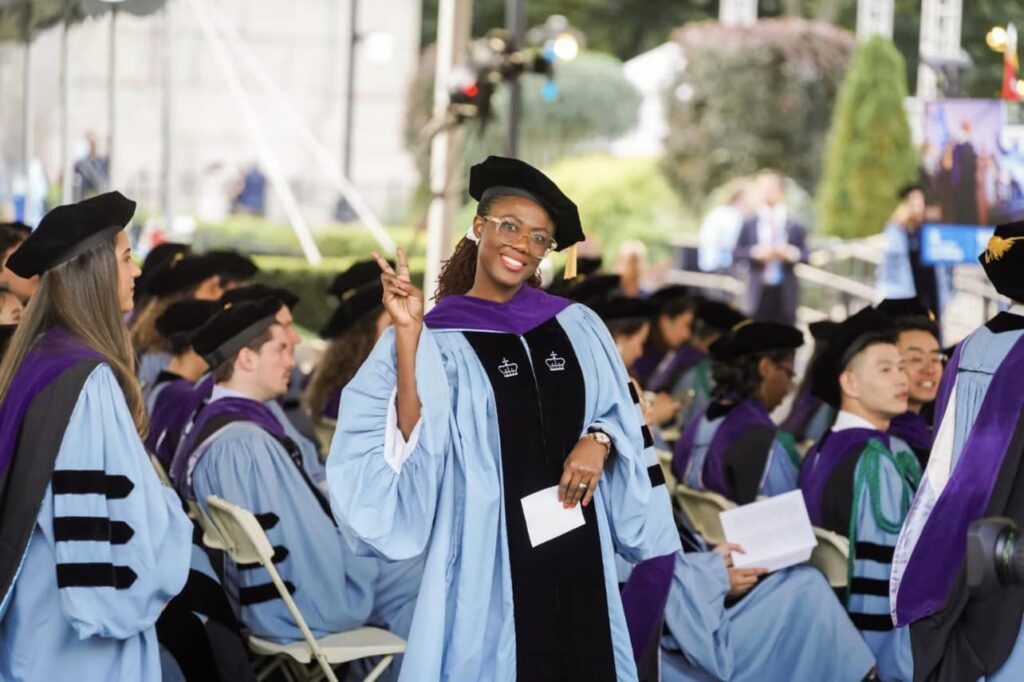
This brilliant friend just graduated from Columbia Law School. I told her I was going to share this beautiful photo on social media as it illustrates my frustration that a lioness like her will be returning home to Ghana only to be led by goats.
THE SKY ISN’T THE LIMIT; POLITICIANS ARE
This has been a season of lots of graduations. I’ve seen flashy photos from Harvard to Fuller, and been physically present at inspiring commencements like Ashesi’s about three weeks ago. First, I’ve been excited about all these amazing graduates bustling with energy and vision and drive, some having done some earthshaking capstone projects and all. Yet all these amazing people formally graduated by our best academic establishments and semi-formally by The HuD Group in the last 20 years—and yes, some of us have been though all kinds of fellowships from Aspen and Eisenhower to Tutu—are restricted by what happens in the political space because everything rises and falls on that leadership. Political leadership is the lid over all our collective effectiveness and greatness.
If anyone told these graduands that the sky is the limit, that isn’t wholly true; our political leaders are. No I’m not a whiner; I am precisely the opposite of that, which is why I’m a serial entrepreneur. So I believe in creative ways around ‘the system’ but as the august chairperson of the HuD anniversary launch, Madam Yawa Hanson-Quao, had earlier said at the MLC, “We cannot entrepreneur our way out of bad governance.” Political leadership is the lid over all our other attempts at leadership.
Political leadership is the lid over all of our collective effectiveness and greatness in all of our fields of work and spheres of influence. We’ve got to get up and take the political space seriously and not let anyone who is not a selfless, authentic, transformational leader make their way there! Because then, it doesn’t matter how the collective brilliance of all of us is, there would be a lid over the rest of us. A good illustration is the proverbial army of sheep led by a lion versus or an army of lions led by a sheep.
At the end of the day, every sector, and every level of our society needs at least good leaders, even better, great leaders! Otherwise like John Gardener aptly puts it, “The society which scorns excellence in plumbing as a humble activity and tolerates shoddiness in philosophy [or politics for that matter] because it is an exalted activity will have neither good plumbing nor good philosophy: neither its pipes nor its theories will hold water.”
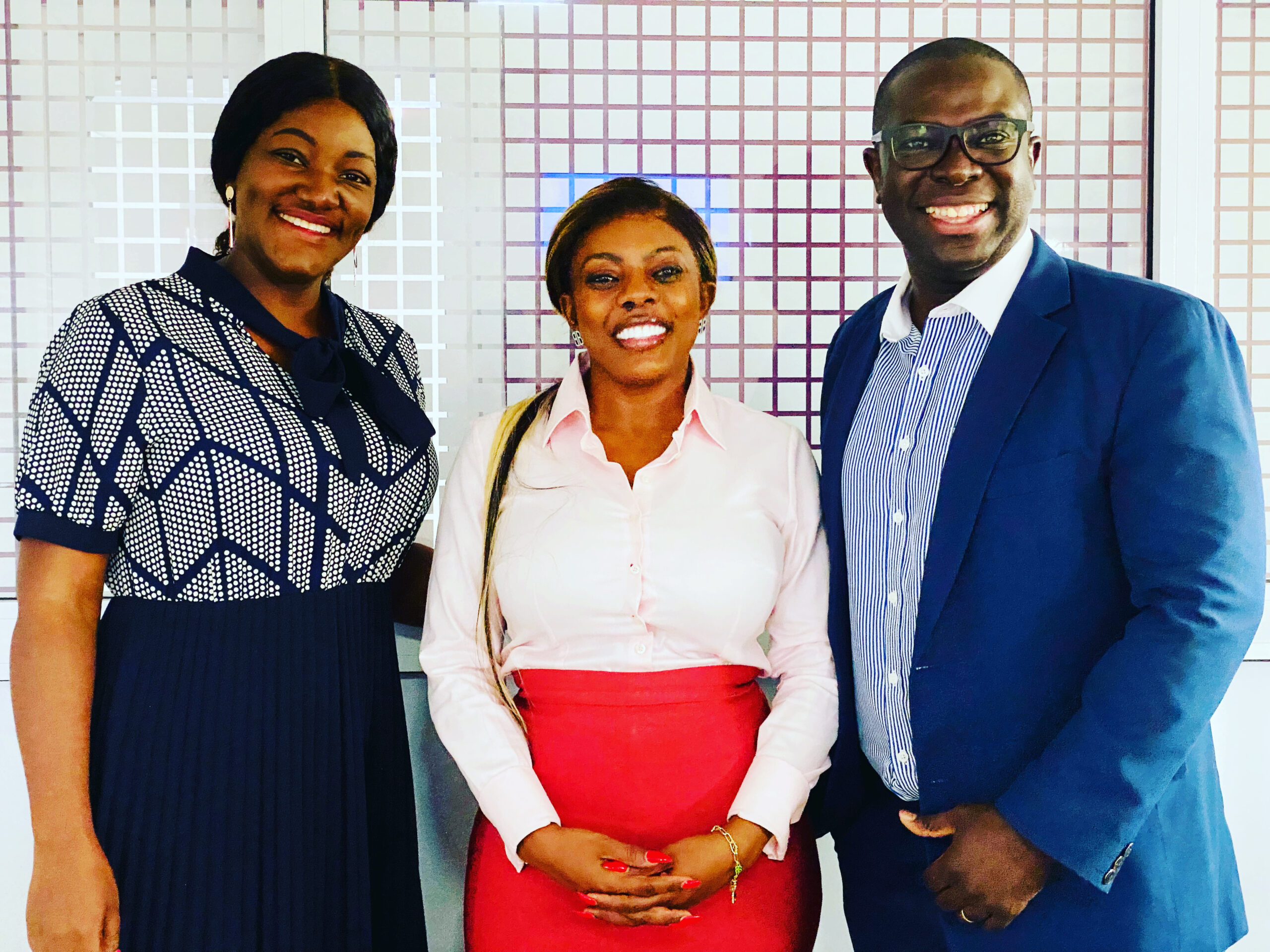
Of Kanévals, Kanébals & Kanévores.
Co-founders of Perbi Cubs sandwiching Kanéval partner-influencer, Nana Aba Anamoah, media personality & General Manager of GHOne TV/Starr FM.
This year, the capital city of Ghana where my wife hails from and where I was born has been named by UNESCO as its twenty-third World Book Capital. Accra takes over from Guadalajara, Mexico (2022) and will be handing the baton to Strasbourg, France come April 2024. Since ‘kané’ is the Ga word for read—and Ga being the language of the Accra people—Perbi Cubs Library services creatively replaced the near-homophonic ‘carni’ in ‘carnival’ with ‘kané’ and coined the word ‘Kanéval’ to bring fun to reading, which is otherwise unfortunately perceived widely as a bore and a chore.
As official partners of UNESCO Accra World Book Capital 2023 (AWBC ‘23), Perbi Cubs will be organizing Kanéval as a fantastic year-long program, a traveling fun fair transitioning from place to place with lots of amusements intertwined with lots of reading. You will find a fuller history of the UNESCO AWBC’23 partnership and details of the year-long fiesta here.
RESCUE FROM KANÉBALS
We are of the conviction that this Kanéval social service campaign needs to involve key influencers from all walks of life, from CEOs to Black Stars players to musicians, to consistently show that reading is fun and leads to success. The campaign will consist of various events in-person and online, including book fairs, storytelling sessions, and community outreach programs. By making reading fun and accessible, we can encourage more people to read and ultimately improve literacy rates in the community.
When we began approaching various influencers to join us on this reading revolution campaign, a massive behavioural change intervention, some of the stories we heard about the generally poor reading attitudes and habits of Ghanaian society were stupefying. We found kindred spirit in Nana Aba Anamoah (photo above), media personality and General Manager of GHOne and Starr FM, who unbeknownst to us had years back initiated a reading campaign known as ‘Raising Readers.’ She too had involved several influencers, including former Ghanaian president Jerry John Rawlings, to read with the children in a certain deprived area of Accra. Book donations in their thousands to the cause were a shot in the arm.
At some point it was clear parental involvement would bolster this behavioural change campaign. Some parent did accompany their children and wards to the reading sessions. Mostly reluctantly. In spite of these mostly illiterate parents sucking their teeth after only a little while, thinking of all the other more ‘productive’ ways they could be spending their time, Nana Aba and team pressed on. In fact, at the height of her intervention they had decided that once a week was not enough for the pace and profundity of the transformation they sought so they decided to leave books with the families and replace them when they returned the week after.
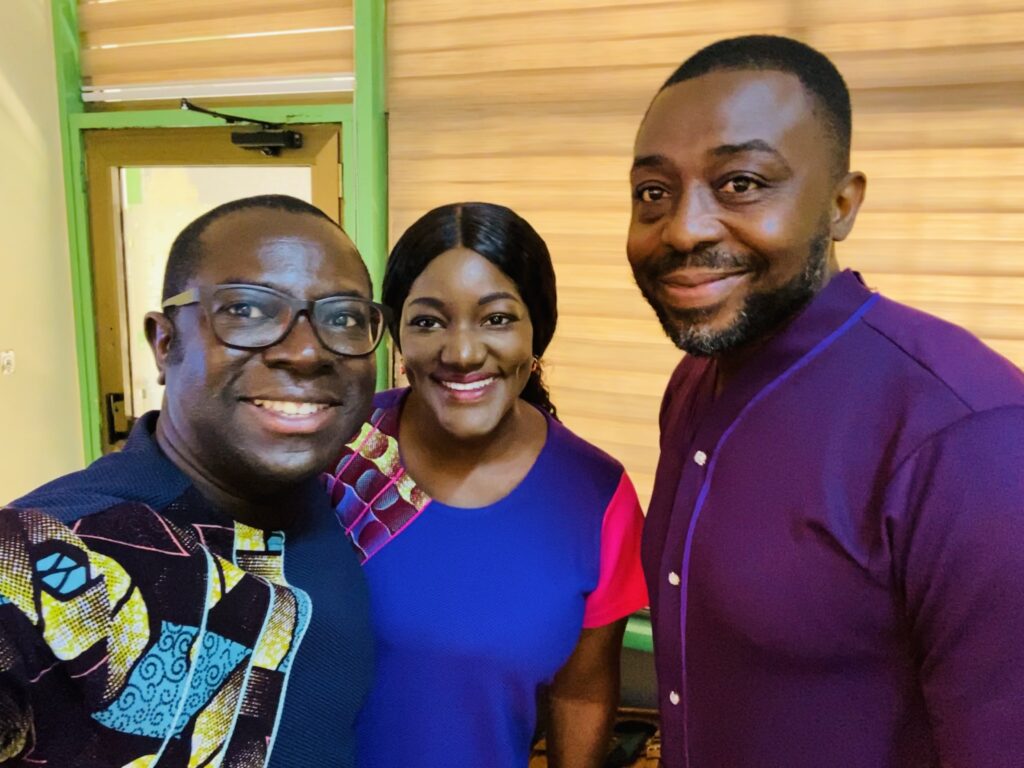
Cofounders of Perbi Cubs with yet another partner-influencer, Kafui Dey, author and GTV Breakfast host
All seemed well and good until the following week when some medical doctors on the Raising Readers campaign team who had gone down the road to grab some snacks returned with horror on their faces. When Nana Aba relates this story, she might not be aware but her face betrays the pain of the let-down she felt. The snacks that the team mates purchased in the catchment area had been nicely wrapped in freshly torn out pages of last week’s books! Kanébals (do you see what I’ve done with ‘cannibal’ and ‘kané’?) had dismembered the hitherto living literary friends, ripping them from their saddle-stitched and perfect-bound spines and repurposing the cadavers as food packaging. Ah!
When we related this story to another influencer on our bill, Kafui Dey (photo above), author and Breakfast host on GTV, he told us worse. Sometimes it’s pages of even the Bible that are Kanébalized for wrapping food!
WANTED: KANÉVORES IN THE KAPITAL
Perbi Cubs, convinced that readers are leaders and leaders are readers, has from inception sought to raise lion-leaders, hence the referral to our 10,000 young patrons as cubs (the young of lions) rather than the typical ‘kids’ (the young of goats).
By the end of the year-long Accra World Book Kapital, we seek to have enrolled an army of at least 100,000 cubs who are voracious readers, Kanévores. If carnivorous lions are the king of the jungle, we imagine that Kanévores rule the world.
KALL TO ACTION
According to UNESCO, as of 2021 only 6% of children in classes two and three in public basic schools could read and understand anything they read. Lack of sufficient reading resources and very large class sizes are among the root causes of the problem, but the overarching root cause is that society does not value reading. Reading is seen as a chore, a punishment or even a necessary evil! Yet per credible research, the love for reading is a stronger indicator of a child’s success in school and their future career than even their parents’ level of education and their socioeconomic status.

With media personality and reigning Ghanaian Journalist of the Year, Portia Gabor, at the TV3 studios in Accra. Portia’s partnering Perbi Cubs for this vital social intervention, Kanéval!
Join us in promoting the joy of reading and improving literacy rates in the community, particularly among children in public basic schools, by becoming a partner for Kanéval. Together, we can make a real difference in the lives of our community members and future generations. Let’s celebrate and make the most of Accra’s selection as UNESCO World Book Capital 2023.
KONCLUSION
Accra has been selected as UNESCO World Book Capital 2023 and Kanéval is a one-year social service campaign organized by Perbi Cubs, as official partners of UNESCO AWBC 2023, to celebrate this achievement and promote the joy of reading and improving literacy rates in the community.
The success of the campaign depends on a coalition of all stakeholders in the book industry, influencers, and strong partnership with the media. Together, through massive Kanévals all year, we can raise Kanévores and end apathy towards the written word that results in Kanébalism and the like. May readers rise and leaders come to light to transform society and impact the world—from Africa to the Rest.

Confluence for Influence: Kanéval by Perbi Cubs Leverages UNESCO’s Accra World Book Capital 2023.
Exciting news! Perbi Cubs Library Services is teaming up with the United Nations Educational, Scientific and Cultural Organization (UNESCO) and the Ghana Book Development Council, among others, to celebrate Accra World Book Capital (AWBC ’23) as official partners. Accra, the capital city of Ghana, in West Africa, is the 23rd city in the world, and only the fourth in Africa, to have the honour of this title which UNESCO initiated in 2001 to promote literacy globally. This is akin to a literacy World Cup title, only it is bestowed annually.
The World Book Capital is an initiative of UNESCO which recognizes cities for promoting books and fostering reading for a year, starting on April 23, World Book and Copyright Day. UNESCO adopted the 31 C/Resolution 29, in 2001, establishing the World Book Capital (WBC) programme. Cities designated as UNESCO World Book Capital pledge to carry out activities with the aim of encouraging a culture of reading and diffusing the values of literacy, lifelong learning, copyright, and freedom of expression in all ages and population groups, both within and beyond national borders. The first city to be awarded was Spain in 2001 and Accra’s turn is sandwiched between Guadalajara, Mexico (2022) and Strasbourg, France (2024).
The UNESCO World Book Capital Advisory Committee, which evaluates bids to win the title, comprises representatives of the International Publishers Association (IPA), the International Federation of Library Associations (IFLA), the International Authors Forum (IAF) and UNESCO. Past capitals include Madrid (2001), Alexandria (2002), New Delhi (2003), Anvers (2004), Montreal (2005), Turin (2006), Bogota (2007), Amsterdam (2008), Beirut (2009), Ljubljana (2010), Buenos Aires (2011), Erevan (2012), Bangkok (2013), Port Harcourt (2014), Incheon (2015), Wroclaw (2016), Conakry (2017), Athens (2018), Sharjah, (2019), Kuala Lumpur (2020) and Tbilisi (2021).
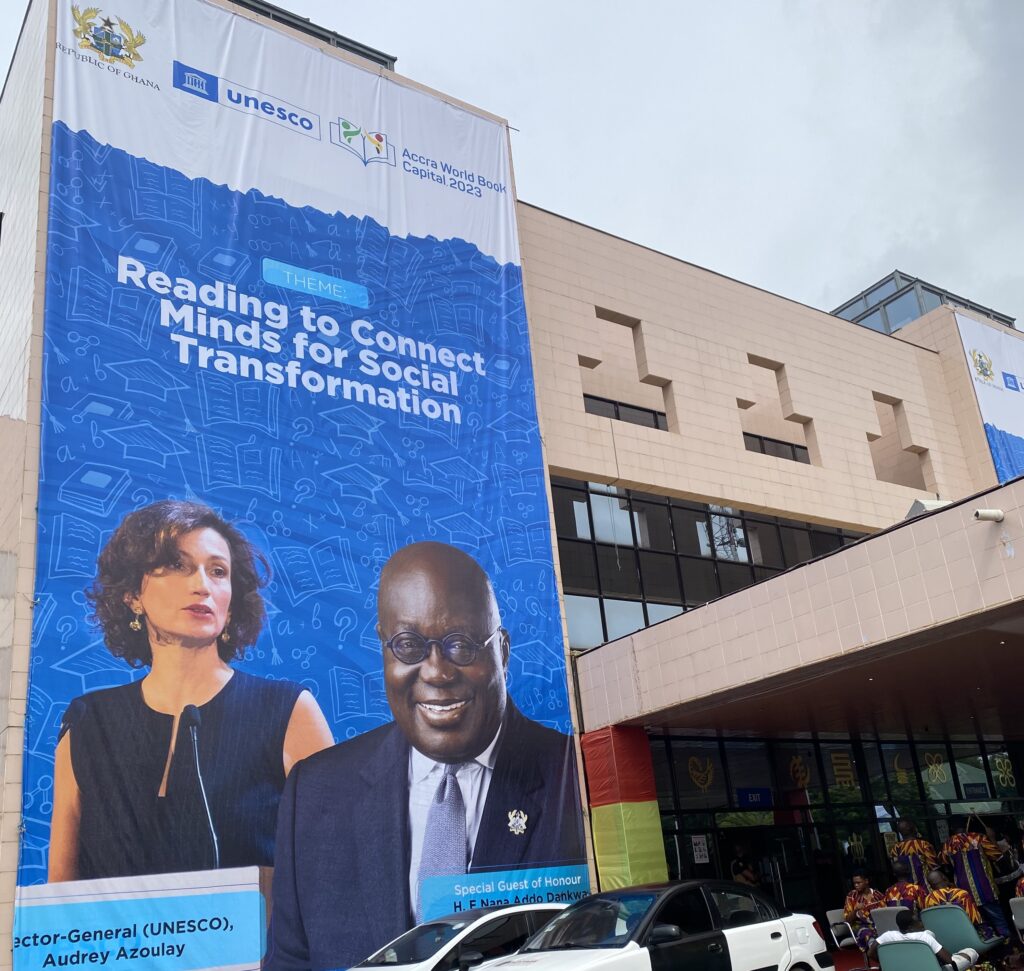
The grand opening ceremony of Accra World Book Capital at the Accra International Centre by the President of the Republic of Ghana
THE GHANA JOURNEY
Accra’s first attempt to win the 2019 World Book Capital title, after the idea was mooted in 2016 and working towards that, failed. Accra relaunched the bid in April 2021 and won it. The executive board of UNESCO, at its 215th session in Paris, France, on September 22, 2021, named Accra the World Book Capital 2023, following evaluation by the World Book Capital Advisory Committee. This was no mean achievement for the ten-member bidding team representing the Accra Metropolitan Assembly, Ghana Commission for UNESCO, Ghana Library Association, Ghana Publishers Association, Complementary Education Agency (formerly Non-Formal Education Division), Ghana Association of Writers, and the Ministry of Foreign Affairs and Regional Integration and chaired by Mrs Ernesticia Lartey Asuinura, the Executive Director of the Ghana Book Development Council (GBDC). Several internal staff of GBDC were behind this successful bid and must be applauded.
According to UNESCO, “the city of Accra was selected for its strong focus on young people and their potential to contribute to the culture and wealth of Ghana. Accra’s proposed programme seeks to use the power of books to engage these young people, as an effective way of skilling up the next generation.” Earlier this year, on April 11, the Minister of Education of Ghana, Dr. Yaw Adutwum, held a press launch of AWBC’23 at which Perbi Cubs was represented by the Founder and CEO, Mrs. Anyele Perbi. He explained that Accra was selected ahead of other cities because the Education Ministry’s programmatic focus was on young people and their ability to contribute to the culture and wealth of Ghana through the power of reading. “Research shows that reading improves the learning outcomes of students in schools,’ said the Minister. “That’s why in certain schools around the world, they’ve implemented and employed the ‘Drop Everything And Read’ – ‘DEAR’. So if it’s 15 minutes, 20 minutes a day, children are made to stop everything and read,” he illustrated.
Dr. Yaw Perbi, Global CEO of The HuD Group and Co-Founder of Perbi Cubs, and Mrs. Anyele Perbi , Founder and CEO of Perbi Cubs, were invited and did attend the grand opening of AWBC ’23 by the President of the Republic of Ghana, Nana Addo Dankwa Akufo-Addo, and the Director-General of UNESCO, Madam Audrey Azoulay Ayoub, at the Accra International Conference Centre. The theme for the occasion was ‘Reading to connect minds for Social Transformation’. It was encouraging interacting with school children as well as top academics at the Perbi Cubs booth, including members of the Ghana Academy of Arts and Sciences. Visiting the exhibition booths of other players in the literacy space was also invigorating but nothing beat the joy of seeing the attending school children flock to the Perbi Cubs stand to sample for a few minutes the thousands of books on their online platform.
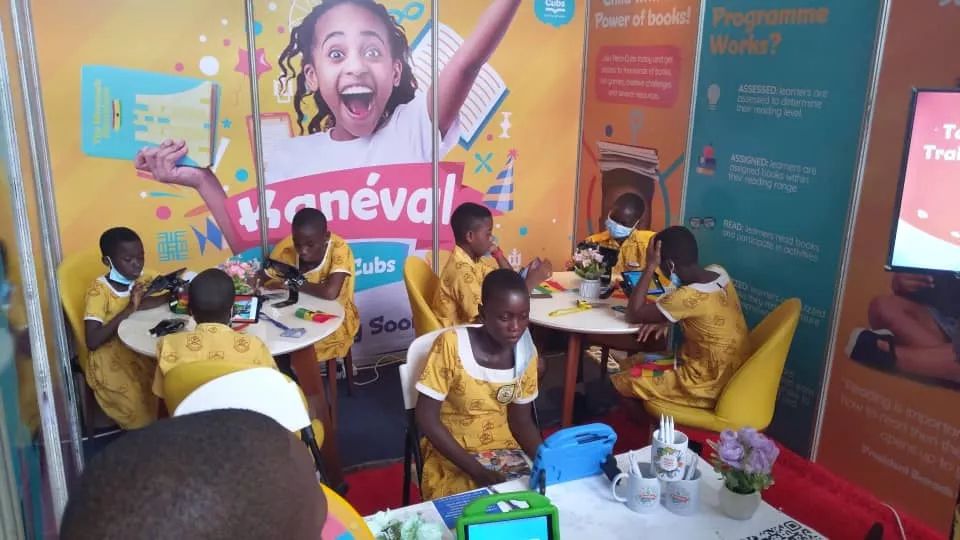
Several groups of school children practicalized the whole point of AWBC by doing actual reading at the launch
Under the theme ‘Reading to connect minds for social transformation’ the programmes planned for the title year will focus on particularly the youth and vulnerable groups in Accra (and Ghana at large) such as children, underemployed women, head-porters (kayayei) and persons living with disability, to equip them with literacy and employable skills, while promoting the rich Ghanaian cultural heritage and the book industry in Ghana.
THE PERBI JOURNEY
Both Yaw and Anyele Perbi (née Ampa-Sowa) come from homes full of books. In fact, they got to know each other as children of professors at the University of Ghana campus. Anyele’s dad was an Economics lecturer and Yaw’s mum, a history lecturer. In their growing up years Yaw’s own dad, being a long-time member of the board of Challenge Bookshop, would receive loads of books every year, feeding their home library fat.
Tracing the history of books even further, Yaw’s maternal grandfather was not only an author and professor of African Studies and Ethnomusicology at the same university, but also together with writer and educator Dr. Efua Sutherland organized the first international book fair in Ghana in the early 1970s and proceeded to come together to found Afram Publications a couple of years later, incorporating it in February 1973. Emeritus Professor J.H. Kwabena Nketia was his name.
The Perbi household buzzed with books and moments like when the floating bookshops, the MV Doulos or Logos ships, would berth at the Tema Harbour were fun galore. Meanwhile, Yaw did not like reading as much as Anyele in their early years on the Legon campus. Anyele LOVED reading to the point that the rate of buying books for her and her two brothers was threatening to bankrupt her parents. When she was missing from the house you could be sure she was immersed in a book somewhere!
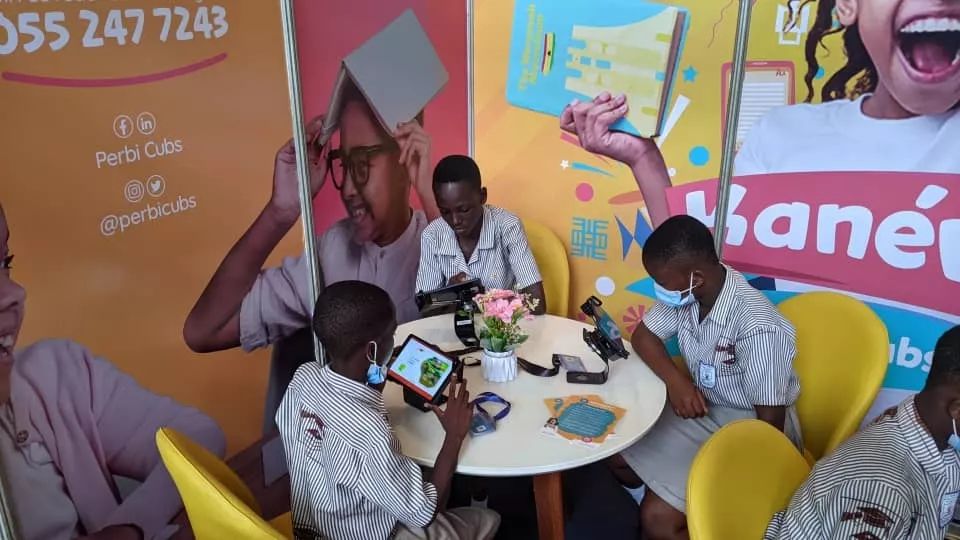
At the intersection of age old reading and new technologies stands Perbi Cubs’ online digital reading platform and offerings
Two jerking statements changed Yaw’s attitude towards books. The first was, “If you want to hide something from a Black people, put it in the book.” You may read the full story here. Fascinatingly, by the age of twenty-three, Yaw would write and publish his first book, What Every Fresher Should Know about University, and as an internationally-recognized author of some twenty books and several book chapters, journal articles etc. now, as they say, the rest is history. Today, one of his punchy books called Read! is subtitled: “You are ‘illiterate’ if you can read but don’t.” Dr. Perbi’s 2015 Thinking Outside the Window was even an Amazon bestseller in its category. His latest book, co-authored with a Kenyan and published in March 2023, is entitled Africa to the Rest. In it, Yaw stresses the need for Africans not only to read but also to write. “Until the lion learns to write,” he reminds us, quoting an old African wise saying, “every tale of the hunt will glorify the hunter.”
When Yaw founded The HuD Group in 2003, one of its first divisions was a library called The Mine (it still runs at the Staff Village of the University of Ghana). So for at least two decades now, Dr. Perbi has been a fierce reading campaigner. And now in tandem with the erudite Anyele, he likes to say “my wife and I have stepped up by stepping down.” What he means by that is, they’ve enhanced their reading campaign (stepped up) but decided to go further down to the age where humans are most pliable: childhood (stepping down). And they began with their our own seven children in the French city of Montreal, Canada which happens to have been the UNESCO World Book Capital in 2005, four years before they would dwell there as a family for the next dozen years. Their own children’s love for reading, the generous 40 books per person supply of the Pierrefonds municipal library across the street from their West Island home and an imminent eight-month visit to Ghana that threatened to stifle this Perbi reading culture combined to birth the Perbi Cubs Library Services. You may find the story and philosophy behind Perbi Cubs here.
AND NOW, KANÉVAL
According to Perbi Cubs CEO, “We are excited to inform you that Perbi Cubs, in partnership with UNESCO Accra World Book Capital 2023, will be organizing a fantastic year-long program. Watch out for Kanéval as it moves round throughout the year, to your school or community. Stay tuned on the various Perbi Cubs social media handles like Facebook, Twitter, LinkedIn and Instagram for more updates.” Kanéval by Perbi Cubs, a season of fun, inspiration, and BOOKS, is launching in Accra on May 11, 2023.
As long as reading remains a chore, we’ll have a problem promoting it. But who doesn’t love a good festival, a carnival? What if we could think outside the box and bring together the idea of a traveling amusement show with merrymaking sideshows, rides, etc. with reading? What if face-painting or getting on a swing was a reward for reading a book? These are some of the disruptive ideas that incubated and eventually hatched Kanéval. The idea of Perbi Cubs in general and KANÉVAL in particular, is to bring FUN to reading while strongly brandishing the connection between reading and success in life.
In the spirit of innovation and creativity, Perbi Cubs values, the coined word Kanéval was inspired by the word for read in Ga, the language of the Accra people, Kané. So combining ‘Kané’ with the English word ‘carnival,’ here we are! There will be lots of fun, reading and other educational activities. Perbi Cubs is grateful to several Ghanaian influencers like Nana Aba Anamoah (media personality and General Manager of GHOne TV and Starr FM), Bernard Avle (Citi Breakfast Show host and General Manager of Citi FM), Kafui Dei (author, speaker and GTV Breakfast host), Portia Gabor (TV3 hostess and Ghana Journalist Association’s reigning Journalist of the Year), Gwen Addo (entrepreneur, author and CEO, The Hair Senta), Giovani Caleb (media personality, radio and TV), Gifty Anti (author, media personality, celebrated journalist) and others who are synergizing with them to take the culture of reading to the next level to transform the fortunes of Ghana and Africa.
Perbi Cubs’ Kanéval is scheduled to take off on 11th May, 2023 at Alpha Beta Education Centres and then to all their partner schools and other communities, particularly deprived ones badly needing a literacy intervention. Kanéval is not just for our Cubs but all our stakeholders including you. There are many activities you can join in with exciting prizes. Kanéval awaits you for a Kanévalistic experience. Kanéval – Reading is fun!!! The amazing part is that in collaboration with various partners, Perbi Cubs is offering huge discounts on their subscriptions so that every Cub in their partner schools can read this year!
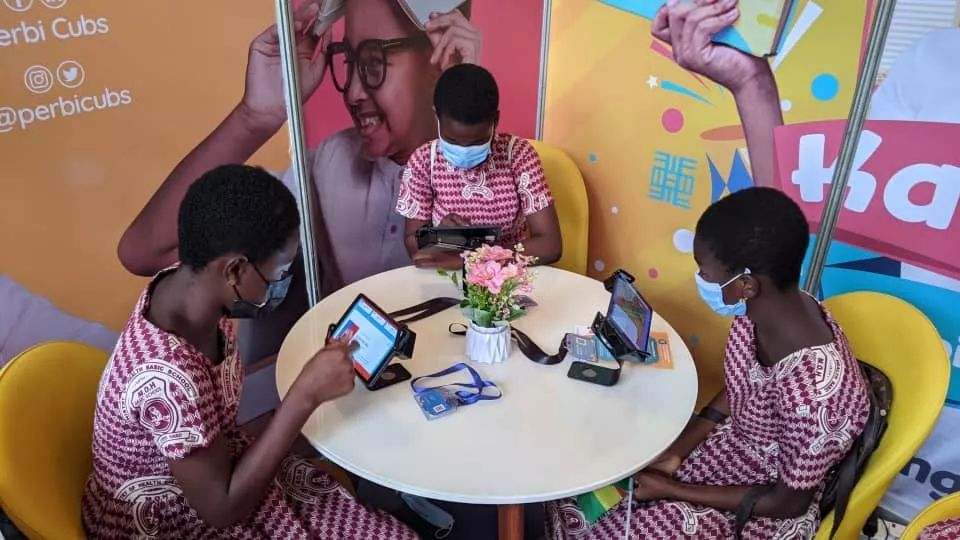
Perbi Cubs has served about 10,000 children so far and is set to scale that in this AWBC year to 100,000
WE HAVE A PROBLEM
Kanéval is fun about something serious. And Ghana in particular has a problem that isn’t funny. As a society we do not value reading enough. If research has proven that the love for reading is a stronger indicator of a child’s success in school and prosperity in life than even their parents’ socioeconomic status or level of education, then we should be worried that only 6% of Ghanaian children at classes two and three can read and understand what they read (UNESCO 2021). Meanwhile the World Book Capital Network (WBCN) acknowledges and reminds us of the power of books and reading as cornerstones to more inclusive, peaceful and sustainable societies. Thus as they rightly put it at Perbi Cubs, “Success is just a book away,” be it personal or national.
Let this be the year we all got dead serious about raising the tide (the general level of literacy) that lifts all the other boats, all sectors and subjects, including STEM. O that the confluence for influence between Kanéval by Perbi Cubs, influencers like those cited above and all other players in the UNESCO’s Accra World Book Capital 2023 space will do the trick. Let’s get on with this serious business, having fun along the way. Kanéval it is!
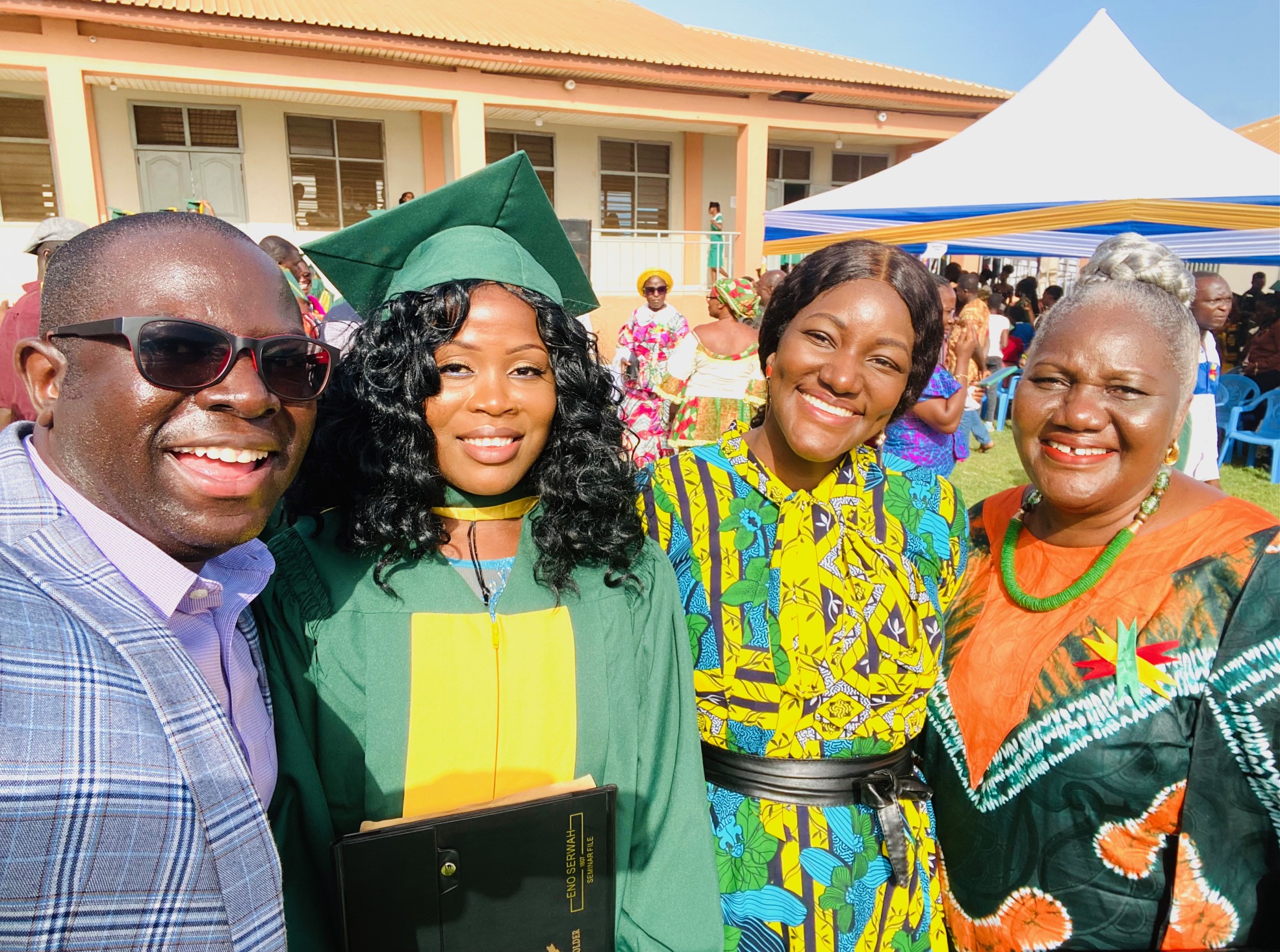
The Way Up is Down.
At Easter, I threw a challenge to the leaders in my network: lay down yourself for someone else’s uplifting. This challenge was triggered by inspiration I received when I had just returned from a college graduation the week before Holy Week. Although it had been a season of graduation ceremonies in Ghana across many tertiary institutions, this was a special one, a very special one.
About six years ago, our family travelled to Ghana from Canada on furlough. We had planned to stay the entire period at my parents-in-love’s residence in Accra. Being a reasonably big-sized big family (the children weren’t even seven yet!) we obviously needed some domestic assistance. We were glad to welcome a promising young lady, Benedicta, as our new house help after a couple of failed trials.
As we lived with her and observed her initiative, diligence, smartness, humility, kindness and care we took an extra interest in what her ultimate dream was. She had the potential to be like any one of us high income, high impact professionals and not necessarily having to be confined to a vocation of domestic assistance her entire life. We found out about her high school final grades and thought they could be improved. And so we (my wife and I, parents-in-love and other family members) decided to invest in her, everything from extra classes through re-sit examinations. Even when she was finally given a shot at college my mother-in-law would get her books and do mock interviews with her to prepare for the entrance interviews. Long story short, she made it into nursing college.Now, that is the graduation we went for that day.
Today, Benedicta is a nurse. She graduated from the Nurses & Midwives Training College in Teshie, Accra, Ghana. From house help to nurse; and that is what brought me to the Easter challenge because at Easter, we see the ultimate leader Himself laying down His life for the people He saw value in. At the risk of sounding holier-than-though, the previous family she left to serve ours was just about to invest in her to be a fried pork seller by the street.
JOHANNINE CHALLENGE
Everybody knows John 3:16: “For God so loved the world that He gave His one and only Son, that whoever believes in Him shall not perish but have eternal life.” But what a lot of people who are not schooled in Trinitarian theology don’t realize is that this scripture is basically saying that God so loved the world—God so saw value in you and me—that he gave Himself for us, because God is Father-Son-Spirit. The ultimate leader laid down Himself for our uplifting.
PAULINE CHALLENGE
This giving of Himself or laying down His life for us is spoken of by St. Paul’s to the Church in Philippi in such humble and humbling terms. He begins in Philippians 2:5 by exhorting that “your attitude should be the same as that of Christ Jesus.” Let’s take Eugene Peterson’s contemporary version:
5-8 Think of yourselves the way Christ Jesus thought of himself. He had equal status with God but didn’t think so much of himself that he had to cling to the advantages of that status no matter what. Not at all. When the time came, he set aside the privileges of deity and took on the status of a slave, became human! Having become human, he stayed human. It was an incredibly humbling process. He didn’t claim special privileges. Instead, he lived a selfless, obedient life and then died a selfless, obedient death—and the worst kind of death at that—a crucifixion.” [1]
Wow! God becoming a man was not just humbling, it was humiliating. Yet even when formed and found in appearance of a human, he could’ve been a very proud man but no! He was down-to-earth and mingled with tax collectors and ‘sinners’. In fact, it was on the night he was betrayed–during Holy Week–that He washed his own disciples’ dirty and stinky feet and wiped them with a towel around his waist.
The way up is down, for because of this humble attitude and action, “God lifted him high and honored him far beyond anyone or anything, ever, so that all created beings in heaven and on earth—even those long ago dead and buried—will bow in worship before this Jesus Christ, and call out in praise that he is the Master of all, to the glorious honor of God the Father.” [2] Even those who are not voluntarily honoring Jesus now will bow one day, compelled. All shall bow to the one who first bowed the lowest and is now raised the highest.
YOUR CHALLENGE
As a leader, I want to challenge you to choose one person, choose one thing to do this month (we’re still in the month of Easter) that involves laying down your preference, time, or money, sacrificing something, dying a little so that someone can live, graduate, have a better life etc. I challenge you to do that because that is the essence of ultimate leadership. Leadership is not about us, it is about those who take inspiration, follow, and learn from us who we get to empower and guide; those around us.
It’s sad to see so many places in the world, especially in Africa, where government official think it is all about them. Unfortunately, even in the church there are a myriad instances where pastors are doing extremely well socioeconomically and there are congregants who are not faring well, at all. Sometimes these leaders are literally fleecing the people, milking them dry till they bleed. That’s not leadership at all, and certainly not servant leadership. Leadership is laying down our lives, laying down our gifts so that others will be blessed. It is going down to pick the downtrodden and lifting them up.
Cecelia Chan poignantly put it this way: “Instead of laying a red carpet for yourself to walk on, lay a bridge and let the young people walk over to you.” This is my challenge to you, at Easter and beyond: lay down yourself for someone else’s uplifting. God bless and honour you too as you learn to lead like Jesus.
References
[1] Philippians 2:5-8, The Message
[2] Philippians 2:9-11, The Message

The Ghanaian Dream is Not What You Think
Just before one of my recent trips out of Ghana, I asked the driver who usually takes me to the Accra airport if he would like to go with me for the experience (he’s never been airborne). His response wasn’t what I expected. I admired him for his brutal honesty and was deeply saddened at the same time. He said, “Dr. P, I won’t lie to you. If I go with you, I’m not coming back.” And he is not alone.
As I’ve been interacting with young people in Accra mainly, but in Ghana generally, it seems the Ghanaian dream is: to get out! i.e. to get out of the country to seek greener pastures. The Ghanaian dream is to exit the nation and l find that so sad on many levels. At the same time that excites me. Let me explain.
THE BAD, SAD & MAD
l find it sad in the sense that whatever the push factors are, they are potent enough to drive a collectivist society that is really keen on kith and kin, in other words one in which friends and family mean so much, to want to leave spouse and children, or parents, to go and struggle in another land just to keep body and soul together. What would make many of our people expire in the wilderness, literally die in the deserts of the Sahara en route to Libya and such, or be buried alive in the Mediterranean Sea between Africa and Europe in desperate attempts to get a better life?
Shame on the fathers and mothers who are making life impossible for our young people. I can totally understand why five hundred (500) years, or even two hundred (200) years ago, we would be forced to get into ships to sail to the Americas but today if anybody brought that same ship people will voluntarily fill it en mass and say, “Take me to the Americas, take me to the Caribbean, take me to Europe, take me to wherever. l want to work for whoever, for whatever; just to get out of here.”
I remember being in a conference last year at Cape Town, South Africa when someone did an incredible presentation on what Ghanaians and other Sub-Saharans go through in wanting to reach Europe by all means, literally. It was revealing how a revived craze is trying to go around the Senegambia coast to the Canary Islands, an Atlantic maritime route largely considered “the most dangerous sea passage for Africans trying to reach Europe.” Regarding the Sahara route, one of the funny but sad question was: “How many Africans can fit into the bucket of a Toyota Hilux pickup truck?” They say, “One more!” One more!! They keep filling and filling and filling these truck buckets with human beings and carry very little fuel and food supplies so they can travel light and transport more people. Whenever there is a breakdown or some delay, people die like flies. The dream becomes a nightmare. O WHY?
THE GOOD
On the other hand, what good can there be in all of this, legitimate and illegitimate attempts at migration alike? Why is there some excitement in my heart? There is titillation because God is a global God and he calls people whenever He wants wherever He wants them to accomplish His eternal purposes. Yes!
One day Paul of Tarsus, the lawyer-turned-preacher, was in Athens, Greece and delivered a ‘TED Talk’ at the Areopagus. Luke the doctor-turned-investigative writer records in parenthesis how “All the Athenians and the foreigners who lived there spent their time doing nothing but talking about and listening to the latest ideas” (Acts 17:21). “Ideas worth spreading,” TED would say. But I digress.
One of the things Paul shared was that God who made us all from one original man, Adam, is the one who determines our boundaries, where we live, and in what period or era in history (Acts 17:26-27). People movements are actually God movements. You see that throughout Scripture, from Genesis to Revelation. A personal attestation to this scriptural reality is how I never wanted to leave the land of my birth, Ghana, to be domiciled in another land, especially outside of Africa. I had no such plans. And I married a woman with a similar mindset. We were doubly resolved. Ironically, my wife, Anyele, was born in Canada and moved to Ghana when she was barely two years old but had no desire to return to the land of her birth. In fact, she had never used that Canadian passport to get back to Canada. Two dozen years later.
One evening in August 2006, God spoke to me so clearly. This was barely three weeks after we were married. I was in a Lausanne Younger Leaders conference near Kuala Lumpur in Malaysia when I heard this in my spirit: ‘It’s my world and l send you where I want you.” Huh! Then in January 2008, the LORD spoke very clearly to us both from Genesis 12. It was just our ‘usual’ morning devotion on an ‘ordinary day’ when these words literally jumped off the pages of scripture: “Leave your country, your people, and your father’s household. And go to a land I will show you.” With no such prior plans of ever leaving Ghana to school or work, in a dramatic fashion our lives were turned upside down. By June I was serving with the United Nations Operation in Cote d’Ivoire (peacekeeping soldier) as a military captain and medical doctor to the U.N. staff and troops mainly, and some local Ivorians. By July, Anyele had been ‘kicked out’ of Ghana too to Montreal, Canada, going to pursue her master’s in economics at McGill University. The first time she was back in two-and-a-half decades.
So that’s the exciting part, that God may be calling people to fulfill His grand purposes in the Arab States, Europe, in another Africa country, the Americas, Australasia… wherever. But l pray that we would be able to help those who are going to go well. And also let our contacts in their destinations receive them well. It behoves on the Church in Ghana, in particular (which accounts for over 70% of the population), to find a way to prepare people well, including blessing them with a healthy diaspora missiology, so they may go well and thrive. It cannot be overemphasized that merely getting to America, Europe or China, is no guarantee one will be successful. We give money to poor people in Canada. There are homeless beggars who have come to squat on our property in America. And the poor in the West are not of only one colour of skin.
Having said that, surely we can do more, much more, to help whoever longs to, or is called to, stay in the land of their birth and make it in Ghana, Nigeria or anywhere in Africa, to be able to make it well also, and very well for that matter.
WHAT’S BEST FOR YOU
Find out what God’s great purpose and plan, position and place (including geographical location) is for your life, for the One who made and redeemed you is a global God. It might not be what you thought. Bottomline: You are only going to prosper where God has purposed and planned you to be planted. Make sure you are planted by God in that place–whether it is in Africa or elsewhere–and in that particular period, where and when you will prosper. Think on these things.
Post Script
Here’s a PEP Talk on ‘The Bad & Good about the Ghanaian dream.’
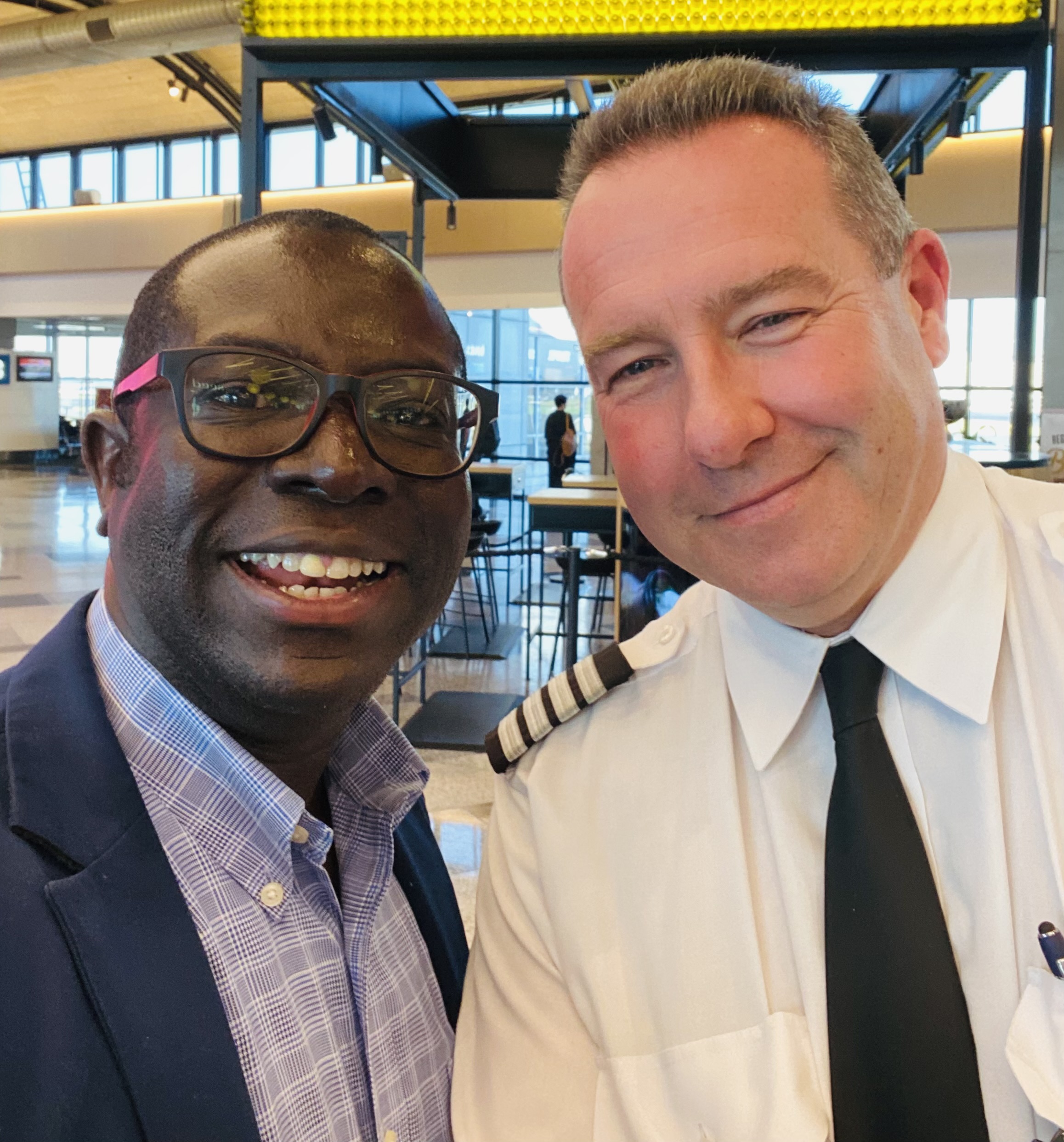
The Pilot and the Preacher.
Call me weird but the smoothest airplane touchdown of my life, today, is my most precious birthday gift. This was Melbourne to Sydney on Jetstar JQ502. I couldn’t help but literally clap my hands in my wing seat (I have said my autobiography just might be titled “Wingman;” I’m almost always flying on the wing!). A few others applauded too. Then as we deplaned and I approached the cockpit I noticed the captain who had performed the magic had his door open and was standing right in front of it, interacting with some passengers. Again, I couldn’t pass by without verbalizing my appreciation of his masterly act. “That was a great landing, sir,” I blurted out. The captain half-smiled, almost embarrassingly, and managed to mutter under his breath his appreciation of my applause.
On the jet bridge a sense of regret began to creep over me. Ah! I should’ve asked to take a photo with him! A little weighed down by that remorseful thought I still, slowly but surely, made my way into the terminal and headed for the place people empty their bladder. Guess who I spotted when I returned to a cafe in the terminal to grab some breakfast: the first officer of the flight, looking to make a purchase. And the captain! Yipeee!
I was happy to repeat my admiration and appreciation and ask for his name and a selfie this time. He graciously obliged. So I gave him some context: over the last eight days I had taken 10 flights–Accra to Amsterdam, to Detroit, to Montreal, to Toronto, to Houston, to Auckland, to Gold Coast, to Adelaide, to Melbourne and now to Sydney–and no landing could compare. I could’ve had a hot cup of tea sitting on my lap during that landing and it wouldn’t have spilled!
WHAT DO YOU DO?
By the time I had shared my itinerary above with Captain Phil Peatfield, he had to ask: “What do you do?” To which I immediately responded, “I am a preacher.” Usually in the marketplace context I would mention something more relatable like leadership consultant or executive coach but it felt so good to say “I am a preacher,” even if it meant I would be canceled (as in today’s ‘cancel culture’). “I used to fly preachers around,” Captain Peatfield responded, to my surprise. Apparently he served with Flying Doctors Australia, a non-profit organisation that “provides emergency and primary health care services for those living in rural, remote and regional areas of Australia who cannot access a hospital or general practice due to the vast distances of the Outback.” I didn’t tell him I’m a doctor too. And well, that I was once a captain as well, a military one.
The irony is that as a little boy I had really wanted to be a pilot. I was fascinated by planes and impressed with pilots’ uniforms. I was starry-eyed when I saw my professor-grandfather’s itinerary as he jet set around the globe lecturing on African ethnomusicology. In a moment of annoyance at a friend in junior high who wanted to be a pilot too (he was too enthusiastic about it for my liking) I snapped out of it and decided becoming a medical doctor would be the way to go.
“PEARL OF GREAT PRICE”
As I celebrate my forty-fifth birthday today, as a preacher I am thankful for this unexpected pilot gift from God. Educationists like Parker Palmer encourage parents to take seriously what early manifestations and proclamations their children make about what they want to do when they grow up. Palmer says in, “Before I can tell my life what I want to do with it, I must listen to my life telling the who I am. I must listen for the truths and values at the heart of my own identity, not the standards by which I must live–but the standards by which I cannot help but live if I am living my own life.”*
As I think of that thing that was triggered in me whenever I heard about or saw my grandpa flying the world, I think of Parker Palmer as a grandfather today.
Watching my granddaughter from her earliest days on earth, I was able, in my early fifties. to see something that had eluded me as a twenty-something parent: my granddaughter arrived in the world as this kind of person rather than that, or that, or that. She did not show up as raw material to be shaped into whatever image the world might want her to take. She arrived with her own gifted form, with her shape of her own sacred soul. Biblical faith calls it the image of God in which we are all created. Thomas Merton calls it true self. Quakers call it the inner light, or ‘that of God’ in every person. The humanist tradition calls it identity and integrity. No matter what you call it, it is a pearl of great price.*
Now that I know what I know, I’m eagerly looking out for what my children, nephews and nieces and young mentees were born to be. God creates no one for nothing. We need to find the clues and lead people in the way they should go–they way they are bent.
BORN FOR THIS
I now know that traveling the world was my calling, even from childhood, although I didn’t get my first plane ride till my late teens. But when it rained it began to pour so much that by age 18/19 I had been to every continent in the world except Australasia/Oceania. What a birthday present to have finally made it ‘down under’ to New Zealand and Australia, a quarter of a century later. And it wasn’t being a pilot or physician that brought me here. It’s the preacher I was born to be. Even the pilot was impressed by the preacher’s itinerary. “Wow, what do you do?” The clue all along was that I was born to travel the world preaching the gospel and raising leader-labourers for the Kingdom of God. I know now that I wasn’t meant to be in the cockpit per se but to enjoy the ride and views–the planes’ and the Lord’s.
Whether a pilot like Peatfield or Perbi the preacher or physician, Palmer’s point is one worth profoundly pondering: “Before you tell your life what you intend to do with it, listen for what it intends to do with you. Before you tell your life what truths and values you have decided to live up to, let your life tell you what truths you embody, what values you represent… Is the life I am living the same as the life that wants to live in me?”* Good food for thought on my birthday.
Reference
*Palmer, Parker J. 2015. Let Your Life Speak : Listening for the Voice of Vocation. San Francisco, Calif: Jossey-Bass.
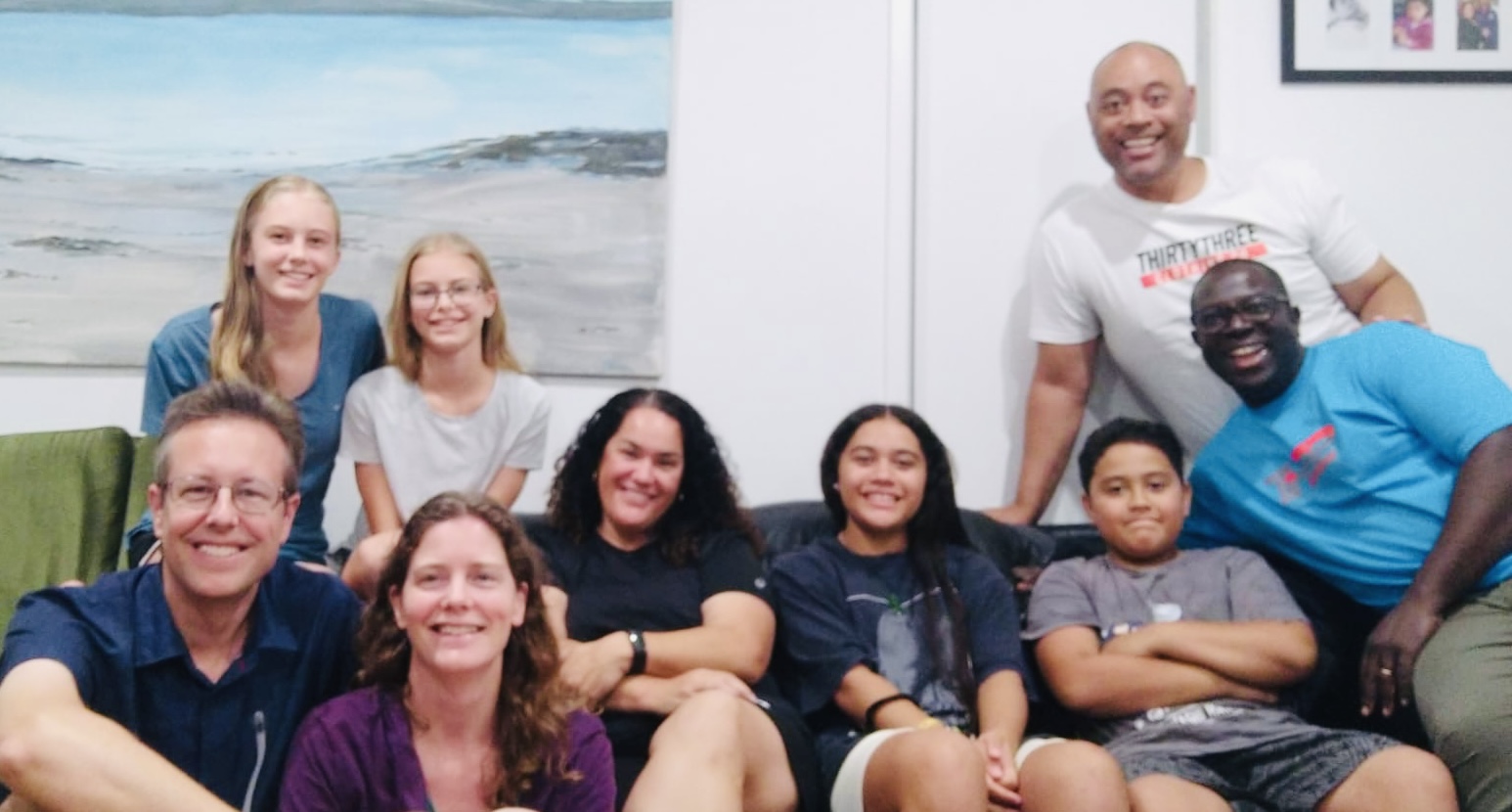
You may have my bag but not my friends.
An exhortation on not allowing circumstances and people who know no better rob you of the wealth of intercultural relationships in our diverse, complex and globalized world.
MYSTERY OF THE MISSING BAG–WHY ME?
I was the last one to walk out of the airport arrival hall at Gold Coast in Australia. I had all the customs and immigration officers to myself, nearly a dozen, yet I gave them absolutely nothing to do. I not only had nothing to declare, I had no bag! Apparently, my only checked-in bag on the three-and-a-half hour NZ 179 flight from Auckland, New Zealand to Gold Coast, Australia had never been loaded onto the plane in the first place. I had waited and waited in vain for it until when nearly everyone on this very full flight had left the baggage hall and Carousel 6 was literally bare, I approached the Baggage Counter to complain about my missing travel companion.
The chap at the Air New Zealand counter was very nice but his assumption that I was going to be in Gold Coast ‘forever’ fascinated me (I’m surprised I wasn’t annoyed).
“Oh sorry sir but your bag will be delivered to you at home tomorrow,” said he.
“Tomorrow? Who told you I’ll still be here tomorrow,” I quizzically retorted.
It was obvious he felt he was doing me a great favour by offering me special at-your-door delivery but I was not amused. Not only did I need the items in my bag today; I was not going to be in Gold Coast in the morrow. This was a 24-hour meet and greet and off to Adelaide, another two-and-a-half hour flight to the western half of the Australian subcontinent.
By now my mind had begun to formulate various plausible permutations why I alone (for I saw no one else approaching the Baggage Counter to lodge a complaint) had my bag delayed. Why me? What was so unique about me that my bag would be singled out for NOT delivery? The only other thing I knew made me different was that I was the only Black African on the flight. Did this have to do with anything?
Interestingly, as I passed through the Auckland airport earlier I had taken a photo in front of the All Blacks memorabilia shop and tweeted “I wonder why I feel so #welcome. #AllBlacks vs #WhitesOnly. How the times have changed–this one, for the better. #NewZealand rocking it!” Did someone spot that and nab me? Was I too quick to praise New Zealand for progressive race relations? Did this bag saga really have anything to do with my Black skin at all? It is easy to read racism into nearly everything once you’ve been a victim of that dehumanizing attitude and act, I must admit. I resist that. I resent that, even.
MYSTERY OF INTERCULTURAL RELATIONSHIPS–SO WORTH IT
All those thoughts and feelings totally dissipated once I set eyes on the last two people left in the welcome area: Julia and Billy-Jo, two of my special friends from the 1997 cohort of the World Vision Youth Ambassadors! Sooo worth the hustle! I had had the privilege of being a World Vision Youth Ambassador for Ghana in 1996 and had the additional honour of returning in Julia and Billy-Jo’s year as a staff intern, together with Claudia from Colombia.
Julia had represented Canada back then and for her, this was our third in-person meeting since 1997 (Prague 2015, Ottawa 2021 and now Gold Coast 2023). But Billy, I had not seen in-person at all since our teenage years! Billy-Jo (yes, she was the first lady I met called Billy–she was way ahead of the gender conversations today!) was the Youth Ambassador from New Zealand. Again, the first Pacific Aboriginal I had ever met, a beautiful Maori, inside and out. Billy’s since become a senior nurse, married to Matt (great guy!) with whom she has three children and migrated to Australia. Interestingly, both Julia and Billy-Jo’s husbands are called Matt. Julia’s Matt is American while Billy’s Western Samoan.
What an incredible day of food, fellowship and fun we had all day, at home and at the Burleigh Beach. The unadulterated love, the open-hearted learning, the deep laughter… What a precious gift we received from Dr. Jerry and Mama Ruth Chang of World Vision Taiwan a quarter-of-a-century ago, a gift that keeps giving, even today.
Now I’m glad our children are getting to know each other as well. The gift ripples on. Just before my family permanently headed to Ghana after a dozen years of being resident in Canada, Julia’s two girls and my brood had a whole day together at their home, right outside of Ottawa, Ontario. In fact, even in the midst of the jamboree we made a WhatsApp video call to Ghana for my older girls to say “hi” to their Canadian sisters. And now that I’ve met Bella and Asher, Billy’s last two (the oldest is away playing rugby and doing school in New Zealand), we have already started conversations about getting them to visit Ghana!
MYSTERY OF INTERDEPENDENCE
Friends, that’s how it ought to be. People are people, made in the image and likeness of their divine Creator, and made to link up with that source, live, love, learn, and lead, leaving a good legacy. Becoming a World Youth Vision Youth Ambassador was a life changing experience–50 young people from 50 different countries. That opened my mind a lot and opened the world to me. As I’ve said before, “My heart expanded and has never been able to shrink again.”
Back to the mystery of the missing bag. For sure I felt very special, having been singled out for some (or no) reason. For good or ill, that’s a conversation for another day. Suffice it to say, this has been a fascinating week, beginning on Monday March 6 in North America (Toronto, Canada and Houston, Texas, USA) with a celebration of the land of my birth’s Independence Day and her renaming from ‘Gold Coast’ to Ghana. I was now ending the week in another Gold Coast, of Australia. The same chaps christened and colonized both; on either side of the equator. What we really need in this world, from individuals to nations, is interdependence; not dependence or independence per se. We were made for this! And we all ought to live the way we were purposed to in order to flourish personally, as families and communities, in the corporate world and among the commity of nations.
In the mean time, you can have my bag but you won’t rob me of the richness of interdependent, intercultural relationships. Never!
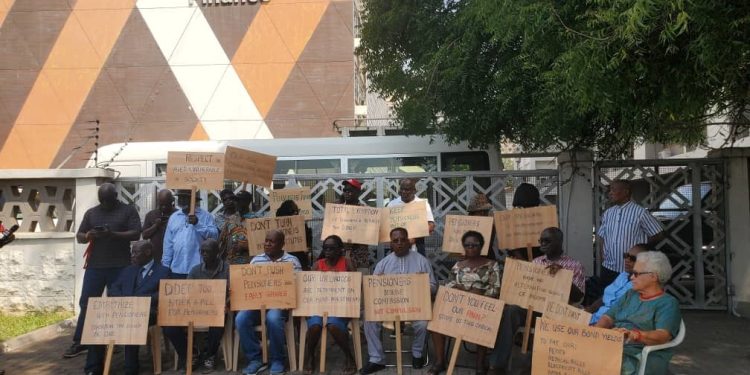
FROM PROFESSOR TO PICKETER: The Lost Generation and the Missing Money
Ghana is neither worth living for nor dying for. That’s how many feel at the moment. Honestly. Think about this: I’ve known Uncle Kweku since his graduate student days on the University of Ghana campus. I was only a lad then. He would later complete his graduate studies, an MPhil in linguistics, and top it up with a PhD from Oregon, USA.
After an illustrious career as an academic (see his brief bio here on the University of Ghana website) he not only retired as a full professor but even served as Pro Vice-Chancellor of Ghana’s premier university. What do we find the illustrious son of Ghana doing these days? Picketing on the premises of Ghana’s Ministry of Finance to demand that the government exempts his and fellow pensioners’ bonds from being sequestered in the dubious Domestic Debt Exchange (DDE) programme. I know for a fact that virtually all of Prof. Kweku Osam’s pension monies are in these bonds. Ei! A former Chief Justice also picketing alongside the other day is reported to have said, “I am over 70 years now. I am no longer government employed, my mouth has been unguarded, and I am talking, and I am saying that we have failed.”
“BACK TO THE FUTURE”
When Uncle Kweku overtly verbalized to the media in an interview on one of the picketing days that he would dissuade his children from ever investing in the Government of Ghana’s financial instruments because “they are risky,” he seemed to have read my mind. Seriously. For while I agree that it is despicable to draw the aged into this DDE debacle and punish pensioners who have planned well for their future and lent their own monies to government to work with, I have an even greater concern for the young people of the country who might take decades to recover from this rude shock. It has taken years to grow a savings and investment culture in Ghana.
As previously started in an earlier article on this matter, “I am pained that, ‘The fathers have eaten sour grapes, and the children’s teeth are set on edge’ (Ezekiel 18:2). For over 20 years now, The HuD Group and I have championed a culture of savings and investments in Ghana, and had the JOY of seeing thousands heeding the call, especially young people.” I recently met one of the young men I used to travel the country with to inspire and teach young people to form investment clubs and start investing. He’s currently the managing director of a major investment company in Ghana. He intimated how this whole DDE disaster made him shed several kilograms over a month, being at the receiving end of verbal and other forms of abuse from frustrated and fearful investors. At the time we spoke, people were withdrawing an average of 100 million Ghana Cedis each day from his outfit. He had already dispatched 2.5 billion Ghana Cedis when we held our conversation.
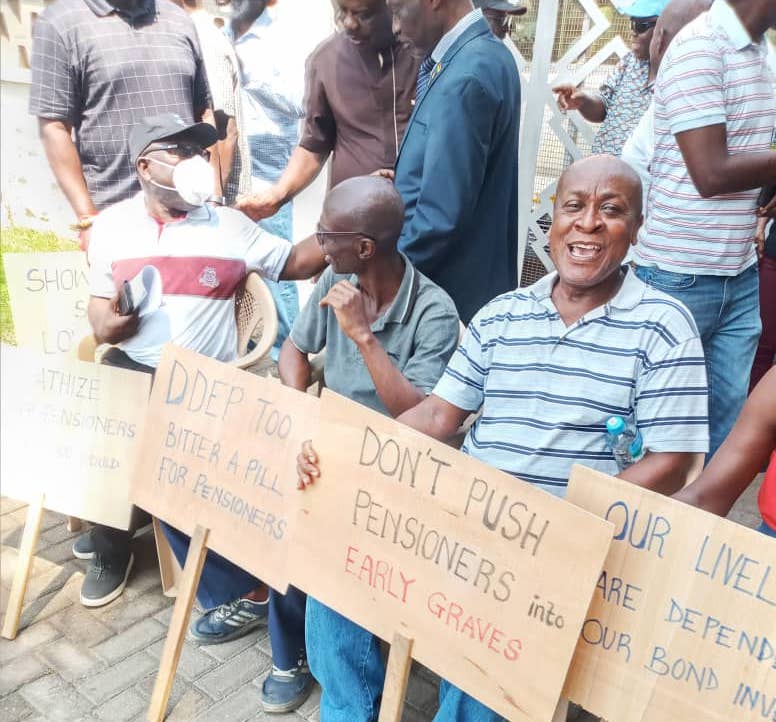
A zoom in on Prof. Kweku Osam, picketing at the Ministry of Finance, with his fellow pension bondholders
BACK TO THE PENSIONERS
So what exactly are we working for? The calibre of pensioners-turned-picketers is disheartening: doctors, engineers, civil servants… If retired professors and chief justices are protesting, what about the no-namers and the many who are too old or too ill to hit the streets? I am privy to a WhatsApp message Prof. Kweku Osam sent that was meant to be just informational, but ended up being very transformational for me:
The last time I took part in a public demonstration against a government of Ghana was in May 1983, as a fresh graduate student. That was when students in the country rose up against Rawlings and his PNDC. Today, God willing, I’ll join fellow Pensioner Bondholders to protest at the Ministry of Finance. The government should leave Pensioner Bondholders alone. Touch not the Pensioner Bondholders.
Think about it: Uncle Kweku began his working life protesting the government. Forty years later, he is ending his working life with yet another anti-government protest. Virtually all his lifesavings is now being held at ransom by a government that has misled and mismanaged her affairs, Covid-19 and Russia-Ukraine notwithstanding. After forty years of wandering in the wilderness between the 1983 protest and the present one on the eve of our sixty-sixth independence commemoration, Ghana itself is a pensioner by age, without much to show for it. We’ve got to do better for our people, old and young alike. Seriously.
Prof. Osam’s generation–my parents’ generation–is the same one the current Finance Minister, Uncle Ken, belongs to. It is the same crop of people who plotted military coup d’etats a generation ago in their youth. Now they won’t exit quietly either, not without a financial coup de grace. With trepidation, dare I call them the lost generation? And they did not only lose themselves and their way, they lost money–theirs and ours.
But to what will my generation and those following rise, having clearly observed that Ghana is not worth living for and Ghana is not worth dying for? That’s how many feel at the moment. Honestly. Think about it.

